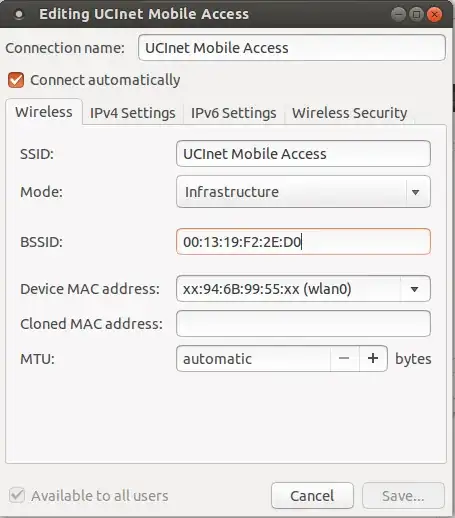It worked, the it dropped, then it worked, now it won't connect to wireless. Brand new Asus laptop that came with ubuntu is connected. The problem seems to be with Ubuntu. It keeps asking for authorization codes for my neighbors signals as well as my signal which the asus is connected to.
Asked
Active
Viewed 1.1k times
6
2 Answers
14
If your wireless drops because it is attempting to roam to the neighbor's access point, I suggest you ask your wireless to bind to your access point. Right-click the Network Manager icon, select Edit Connections. Fill in the MAC address for your access point; find it with:
sudo iwlist wlan0 scan
For example:
Cell 05 - Address: 00:13:19:F2:2E:D0
Channel:6
Frequency:2.437 GHz (Channel 6)
Quality=66/70 Signal level=-88 dBm
Encryption key:on
ESSID:"UCInet Mobile Access"
Use the address (MAC address) you found to place in BSSID in Network Manager:
Save and close.
chili555
- 60,188
-
1I've written a bash script that will do this automatically. It will check the strengths of any found access points for the given network SSID and ask if you want to update the setting to its MAC address. This would be useful if you move around a lot and want to ensure you have the strongest signal.
Usage:
./set-access-points.sh [network SSID] [network interface id = wlan0]https://gist.github.com/archy-bold/9a4cdee49309e4a2d059c900362fa9dc
– Simon Feb 01 '18 at 12:25 -
2This solution did not work for me. I mention this because down-voting is not constructive. – psiphi75 Mar 14 '18 at 02:57
-
Note that this still works with the new network manager in Gnome-based versions of Ubuntu (17.10+). In fact the BSSID field is a drop-down so you don't necessarily have to copy-paste the BSSID, as long as you know part of it. – Dane Powell Mar 24 '18 at 15:23
0
After trying all sorts of suggested solutions, finally, it worked (30 minutes, no drop; earlier there was a drop every <2 minutes) after restarting the wifi modem.
Doi
- 21
-
Hello. Nice that it does that but how is this an answer to the question asked? – David Mar 31 '22 at 14:36
-
This does not really answer the question. If you have a different question, you can ask it by clicking Ask Question. To get notified when this question gets new answers, you can follow this question. Once you have enough reputation, you can also add a bounty to draw more attention to this question. - From Review – David Mar 31 '22 at 14:36
Blockquote
Use the address (MAC address) you found to place in BSSID in Network Manager
– user296844 Jun 22 '14 at 13:24